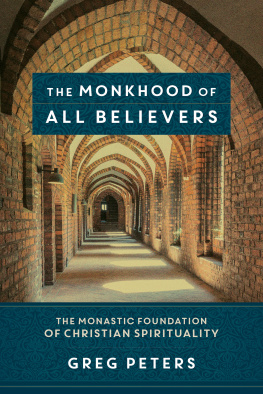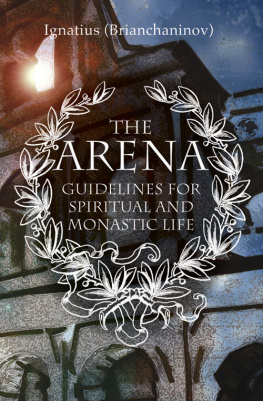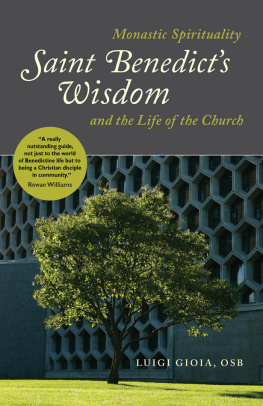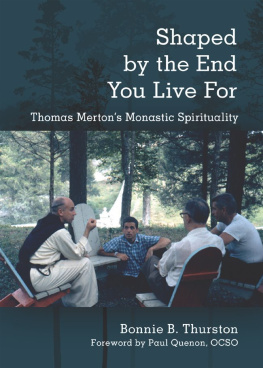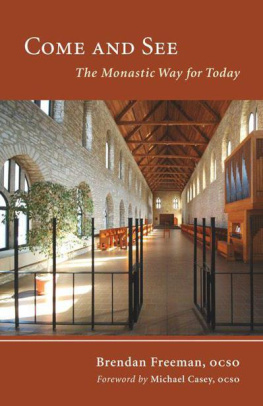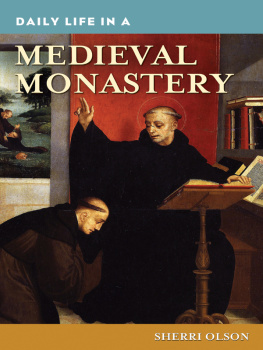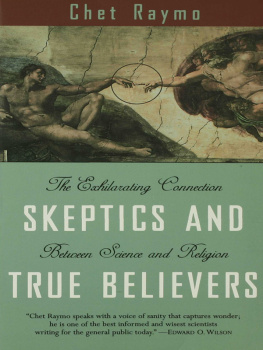Greg Peters - The Monkhood of All Believers: The Monastic Foundation of Christian Spirituality
Here you can read online Greg Peters - The Monkhood of All Believers: The Monastic Foundation of Christian Spirituality full text of the book (entire story) in english for free. Download pdf and epub, get meaning, cover and reviews about this ebook. year: 2018, publisher: Baker Publishing Group, genre: Religion. Description of the work, (preface) as well as reviews are available. Best literature library LitArk.com created for fans of good reading and offers a wide selection of genres:
Romance novel
Science fiction
Adventure
Detective
Science
History
Home and family
Prose
Art
Politics
Computer
Non-fiction
Religion
Business
Children
Humor
Choose a favorite category and find really read worthwhile books. Enjoy immersion in the world of imagination, feel the emotions of the characters or learn something new for yourself, make an fascinating discovery.
- Book:The Monkhood of All Believers: The Monastic Foundation of Christian Spirituality
- Author:
- Publisher:Baker Publishing Group
- Genre:
- Year:2018
- Rating:4 / 5
- Favourites:Add to favourites
- Your mark:
- 80
- 1
- 2
- 3
- 4
- 5
The Monkhood of All Believers: The Monastic Foundation of Christian Spirituality: summary, description and annotation
We offer to read an annotation, description, summary or preface (depends on what the author of the book "The Monkhood of All Believers: The Monastic Foundation of Christian Spirituality" wrote himself). If you haven't found the necessary information about the book — write in the comments, we will try to find it.
Greg Peters: author's other books
Who wrote The Monkhood of All Believers: The Monastic Foundation of Christian Spirituality? Find out the surname, the name of the author of the book and a list of all author's works by series.
The Monkhood of All Believers: The Monastic Foundation of Christian Spirituality — read online for free the complete book (whole text) full work
Below is the text of the book, divided by pages. System saving the place of the last page read, allows you to conveniently read the book "The Monkhood of All Believers: The Monastic Foundation of Christian Spirituality" online for free, without having to search again every time where you left off. Put a bookmark, and you can go to the page where you finished reading at any time.
Font size:
Interval:
Bookmark:
I often tell guests, or curious visitors, at our monastery that one of the things a monastery is good for is that it puts on display, as an evangelizing word, the ingredients of any serious Christian life. Peterss book affirms this in systematic detail, linking key texts from the tradition of monastic life with an invitation to contemporary Christians to let those insights mark them. It crosses denominational divides as it does so. This book meets the contemporary interest in monasticism, an ancient tradition still very much alive.
Jeremy Driscoll, OSB, Abbot of Mount Angel Abbey
This is essential reading for anyone interested in the roots of monasticism and why monastic life still matters today. The Monkhood of All Believers could not be more timely, since for the first time in history there are now more lay associates of monasteriesmen and women, Catholic and Protestant, married and single, working and retiredthan there are monks and sisters living within monastery walls. They are among the growing number of believers Peters identifies as interior monks. Just as Martin Luther spoke of the priesthood of all believers, Peters sees the definition of monk and monastic expanding and adapting into the monkhood of all believers, reflecting the spiritual reality of the twenty-first century.
Judith Valente, author of How to Live: What the Rule of St. Benedict Teaches Us about Happiness, Meaning, and Community and The Art of Pausing: Meditations for the Overworked and Overwhelmed
This reader-friendly book is an exploration on the meaning of monk from various early and medieval sources. A monk is simply one who is single-mindedly devoted to God despite being associated with institutional forms. By drawing upon medieval sources such as Robert de Sorbons sermon on marriage and The Abbey of the Holy Ghost , and the more recent Russian Orthodox writer Paul Evdokimov, as well as Luthers and Calvins critiques of the institutions of monasticism of their day, Peters presents an ecumenical theology of monasticism. His work, which makes room for Protestants to live out an interior monasticism of the heart, adds an important theological dimension to the explorations of monastic spirituality today across the Christian and Orthodox spectrum.
Mary Forman, OSB, professor emerita, College of Saint Benedict and Saint Johns University, Minnesota; prioress of the Monastery of St. Gertrude, Cottonwood, Idaho
2018 by Greg Peters
Published by Baker Academic
a division of Baker Publishing Group
PO Box 6287, Grand Rapids, MI 49516-6287
www.bakeracademic.com
Ebook edition created 2018
All rights reserved. No part of this publication may be reproduced, stored in a retrieval system, or transmitted in any form or by any meansfor example, electronic, photocopy, recordingwithout the prior written permission of the publisher. The only exception is brief quotations in printed reviews.
Library of Congress Cataloging-in-Publication Data is on file at the Library of Congress, Washington, DC.
ISBN 978-1-4934-1556-4
Scripture quotations are from The Holy Bible, English Standard Version (ESV), copyright 2001 by Crossway, a publishing ministry of Good News Publishers. Used by permission. All rights reserved. ESV Text Edition: 2011
To those who have taught me the most about monasticism:
Fr. Abbot Denis Farkasfalvy, OCist
Fr. Columba Stewart, OSB
Prioress Mary Forman, OSB
Fr. Michael Cusato, OFM
Fr. T. Allan Smith, CSB
Fr. Luke Dysinger, OSB
Fr. Luigi Gioia, OSB
Though they might not agree with everything written in this book, I owe most of what I know about Christian monasticism to their teaching and scholarship.
Cover
Endorsements
Title Page
Copyright Page
Dedication
Foreword
Acknowledgments
Abbreviations
Introduction
Part 1: What Is a Monk?
1. Defining the Monk
2. The Monk in History
3. Interiorized Monasticism
Part 2: Asceticism: The Monastic Vocation
4. Defining Asceticism
5. The Priesthood of All Believers
Part 3: The Monkhood of All Believers
6. All Monks Are Christians and All Christians Are Monks
7. The Vocation of Monasticism
Epilogue
Bibliography
Index
Back Cover
V irginia Woolf once wrote that there is a spot the size of a shilling at the back of ones head, and that one of the good offices that men and women can perform for one another is to describe that spot. There are, she suggests, things about us that we just cannot see for ourselves.
Suppose it is the same in the church. Suppose that there are things about each ecclesial body that it cannot see for itself. Suppose, then, that Lutherans can know themselves better when Roman Catholics describe them, that Copts can learn about themselves by listening to Methodists.
If that is the case, we ought not to be surprised to find a cradle Baptist seeing something in the history of monasticism that has often been overlooked. Though he is now an Anglican, Greg Peters retains the Protestant attention to personal devotion, centrality of the laity to the life of the church, and suspicion of any two-tiered account of holiness.
What Peters findsand here is where he will surely ruffle some feathersis that the church of Jesus Christ is composed exclusively of monks. By virtue of our baptism into the life of Christ, every believer is called to love God with an undivided heart, is called to an interior monasticism. All believers are monks. Further vows do not intensify this primary calling; they only specify its location. I Surrender All is a song for all believers, not just those behind the cloister wall.
This would be an easy argument to get wrong. Even if we grant the necessity of personal holiness, does not this obscure the witness of historic monasticism? It certainly might, but it might just as easily serve to highlight something often neglected: the common call to holiness in life together. As Peters points out, recognition of the common priesthood of all believers rarely leads to the elimination of church leaders; rather, it invites and empowers the laity to take responsibility for the work of the church. Similarly, universal monasticism need not signal the end of the cloister; it might instead awaken believers to the uncomfortable reality that monks and nuns are not surrogates, that even engineers and teachers are called by Christ to be entirely devoted to God. Peters himself insists that he is no iconoclast. In arguing that all Christians are monks, he does not suggest that we are in a postmonasticism moment. No, God continues to call women and men into monastic institutions, not least to exemplify the call that all Christians receive in baptism to be single-minded toward God.
Furthermoreand this is salient to Peterss argumenthis is not a particularly Protestant argument. The monastic life has always been about the interior singleness of heartrather than, say, celibacy, perpetual vows, or religious ordersand Peters argues (mostly from non-Protestant sources) that this best accounts for the diversity of expressions and self-understandings of monks. This is not merely a critical corrective, but an ecumenical theology of monasticism.
Matt Jenson
Biola University
. Virginia Woolf, A Room of One s Own (New York: Harcourt, 1929), 90.
I have had the welcome opportunity of writing several books over the past few years, and I have come to learn something about the task of writing; or at least I have learned something about writing nonfiction, academic booksthey start and end with great enthusiasm, but there is the longue dure in the middle. During this season I have often wondered, what have I gotten myself into here? Or, why did I think this was a good idea when I first proposed the book? Or, more simply, will I ever finish? This has been my experience several times now, and I have come to realize that getting through this longue dure takes a large dose of good, old-fashioned self-discipline. But it also takes people, and the assistance they provide, which is sometimes obvious but more often less apparent than we realize. During the writing of this book I was assisted by a number of people, who were often just being themselves but who, in the long run, made this book possible.
Font size:
Interval:
Bookmark:
Similar books «The Monkhood of All Believers: The Monastic Foundation of Christian Spirituality»
Look at similar books to The Monkhood of All Believers: The Monastic Foundation of Christian Spirituality. We have selected literature similar in name and meaning in the hope of providing readers with more options to find new, interesting, not yet read works.
Discussion, reviews of the book The Monkhood of All Believers: The Monastic Foundation of Christian Spirituality and just readers' own opinions. Leave your comments, write what you think about the work, its meaning or the main characters. Specify what exactly you liked and what you didn't like, and why you think so.

